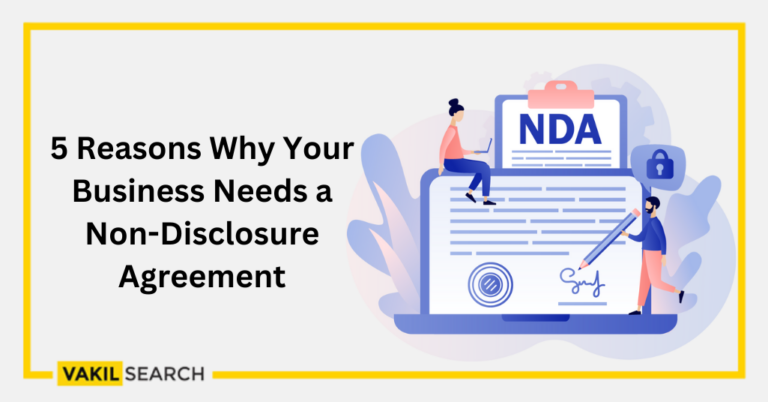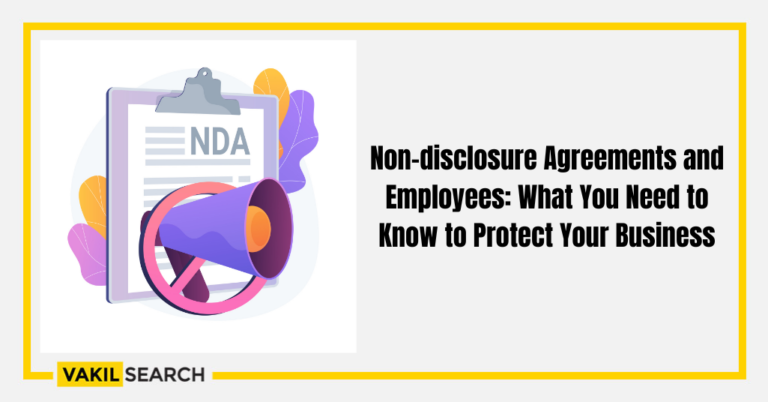A Non Disclosure Agreement (NDA) is governed by the Indian Contract Act of 1872, and it is a legally binding contract under it. The NDA agreement is recommended to be stamped to ensure its continued legality. Read the following article to learn more.
A non-disclosure agreement is an arrangement between a Massachusetts employer and an employee. It mandates the worker not to disclose particular information learned at work. These contracts are often known as confidentiality agreements since they require employees to maintain confidentiality.
Is NDA a New Addition?
Non-disclosure agreements are not a new addition to the Indian employment scene. businesses have been using them for decades to keep competitors from having access to information.
Confidentiality contracts have recently grown in favour as software and technology firms. Employers in the sales business use them to protect client lists that require significant financial and resource efforts to acquire. Nonetheless, practically every company in any business may require you to sign a non-disclosure agreement.
Employers may need you to sign this type of restrictive covenant as a condition of employment. Before you begin working, they can ensure you keep the information confidential. Other organisations may request that you agree to non-disclosure terms as part of a severance agreement if you are terminated.
Non Disclosure Agreement Enforceability Statutes
In general, secrecy agreements are enforceable when they meet the standard contract conditions. However, because NDA agreements and legally binding contract have the potential to limit employees’ job mobility, there are legal rules at the state and federal levels that mainly address them.
Massachusetts Law
The legal landscape in the state governing confidentiality agreements is formed from both statutes and case law. Although Massachusetts has not adopted the Uniform Trade Secrets Act, there is a clause prohibiting the illicit acquisition of trade secrets.
The statute is intended to punish embezzlement, stealing, fraud, copying, and other forms of misbehaviour, but a violation of a non-disclosure agreement may also be considered illegal.
If you breach the terms of a legally binding non-disclosure agreement, your employer may sue to get a “cease and desist” order to prevent you from engaging in unlawful conduct in the future.
Furthermore, under certain conditions, an employer may sue you for monetary damages for all losses incurred due to your breach of confidentiality agreements. It is worth noting that Massachusetts law allows a court to double the number of damages if the judge deems it suitable for legally binding contract.
Federal Law
The majority of non-disclosure agreement statutory and case law is the domain of individual states. However, there are certain federal statutes on the subject. For starters, misappropriation of trade secrets is a crime under the Economic Espionage Act.
A broad reading of the term “trade secrets” could imply that customer lists and some sensitive information are protected, resulting in a private cause of action. The Company can get simple Draft of NDA Agreement Online.
Make a Non Disclosure Agreement Unenforceable
Restrictive covenants are viewed negatively by Massachusetts courts because they impose an unfair burden on a former employee’s job possibilities. Judges will only enforce a non-disclosure agreement if it is in accordance with state trade secret law. Every scenario is unique, but the following factors may cause a judge to rule that a confidentiality agreement is unenforceable:
Overly Broad Language
Because secrecy agreements are so directly linked to your ability to earn a living after leaving your current company, they must be tightly designed. Overly broad language is likely to be viewed as unduly restrictive if it does not adequately support the employer’s legitimate interests. NDA Draft are most commonly found to be unenforceable when they are not limited in length or scope
Illegality
Courts will not enforce a contract if the underlying aim is illegal. To show illegality, the contract’s fulfilment must require you to commit a crime. Illegality may exist in the context of a non-disclosure agreement where the contract forces you to keep the certain subject matter confidential in contravention of a legal requirement to report it
Lack of Consideration
When an employer requires that you sign a non-disclosure agreement as part of a separation arrangement, insufficient consideration frequently arises. A court will not enforce it on the basis of lack of consideration unless your employer provides additional consideration beyond what is already a legal requirement
Unconscionability
When a confidentiality agreement contains clauses that are so one-sided and self-serving that they are severely unjust, it may be unenforceable on the basis of unconscionability. The usual rule is that no rational, well-informed person would agree to it. Hence the party who requested it should not gain from it. In determining unconscionability, courts consider the following factors:
- The party who drafted the Shareholders agreement had superior bargaining power or knowledge
- The party who signed the contract was in a weaker position due to age, lack of choice, experience, mental capacity, or other qualities
- There was a complete lack or severe insufficiency of consideration
- Many other circumstances make enforcement unfair.
It is important to note that unconscionability is often associated with misrepresentation and duress, both of which are discussed in depth below.
Risk to Public Health and Safety
Even if otherwise enforceable, a court will not compel you to comply with a non-disclosure agreement that, if performed, poses a risk to public health and safety. Because the subject of such a contract is sensitive information. This element resembles illegality in certain ways: If your silence could endanger others, your employer cannot compel you to keep the details private
Confidentiality Issues
A non-disclosure agreement will not be enforced by a court if the material sought to be protected, such as trade secrets or client lists, is not genuinely confidential. Details that are publicly available, within the relevant business, or known to you prior to signing the contract are not protected. This regulation also applies in situations where another firm may create the information without using the sensitive material
Duress
A fundamental principle of contract law is that agreements must be freely entered into by both parties who mutually agree on the terms and conditions. If assent is influenced by coercion, pressure, or threats, it is not truly mutual, as required for the formation of a contract. Duress is a defence against a contract, including a non-disclosure agreement, that renders it unenforceable by an employer against an employee who was duped into signing it
Misrepresentation
When an employer makes a false or misleading statement of truth, misrepresentation may constitute grounds for declaring the contract unenforceable.
To claim misrepresentation against an employer, the statement must have been critical in persuading you to enter into the employment contract; a statement that was insignificant or irrelevant in persuading you to sign the NDA agreement will not be grounds for unenforceability
Excessive Demands
All contracts must place reasonable rights and obligations on the parties. Courts may not enforce an employer’s non-disclosure agreement if its expectations are unreasonable, exorbitant, or unworkable.
Conclusion:-
While this summary may be helpful in understanding the purpose of non-disclosure agreements, applicable statutes, and issues affecting the enforceability, there is a wealth of knowledge available in this area of law. To effectively safeguard your interests, you must have a thorough understanding of the legal issues at hand, as well as vast expertise with these types of contracts.
Read more:-










